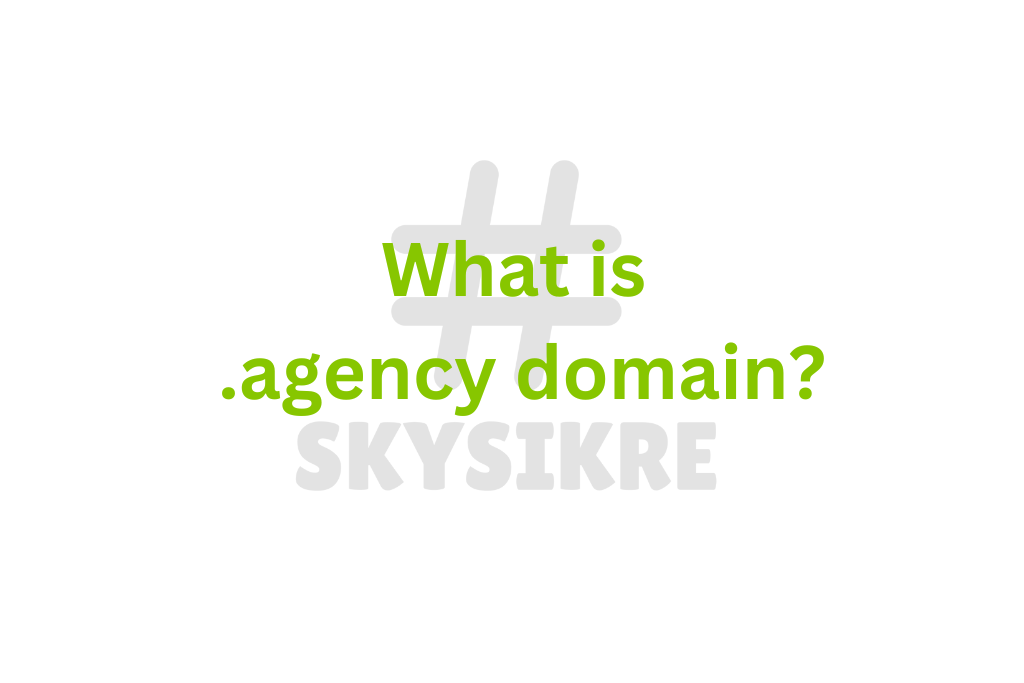Introduction to .agency Domains
The .agency domain is a specialized top-level domain (TLD) designed primarily for businesses and organizations that identify as agencies. Over the past few years, the internet has witnessed a significant rise in the use of various specialized domain extensions. This shift is largely fueled by an increasingly competitive online landscape, where unique identifiers help distinguish companies from one another. By adopting a .agency TLD, businesses can effectively signal their professional expertise in a specific sector, such as advertising, marketing, consulting, or talent representation.
Agencies opting for a .agency domain often aim to enhance their branding strategy. This TLD allows them to create a direct connection between their service offerings and their online presence, making it easier for clients to recognize their industry affiliations. Importantly, a well-chosen domain reflects an agency’s specialization and is an essential part of their overall identity. In a world where first impressions are made online, selecting a relevant domain is crucial for establishing credibility and attracting potential clients.
In addition to the branding advantages, utilizing a .agency domain may also improve search engine optimization (SEO) efforts. By incorporating relevant keywords into the domain name, agencies can potentially increase their visibility on search engines. This strategic choice aligns with the broader trend of domain customization, which seeks to provide a more tailored online experience for users. As businesses continue to explore diverse domain options, the .agency TLD stands out as a relevant and practical solution for agencies committed to establishing a strong online presence and engaging effectively with their clients.
History and Approval of .agency Domains
The .agency domain is a relatively recent addition to the array of top-level domains (TLDs) available to users on the Internet. It was introduced in 2014 as part of a broader initiative by the Internet Corporation for Assigned Names and Numbers (ICANN) to expand the domain name system, allowing for greater flexibility and specialization of domains. The introduction of .agency aimed to cater specifically to businesses and individuals in the agency sector, providing a dedicated space for advertising, marketing, public relations, and other agency-related services.
The management of the .agency TLD falls under the purview of registrars accredited by ICANN, who handle the registration process and ensure compliance with established regulations. The overarching goal of .agency domains is to create an online environment where agencies can enhance their branding and improve visibility within their respective industries. As the demand for specialized extensions has increased, the .agency domain quickly became popular among agencies of various types, including creative, digital marketing, and talent representation agencies.
The approval process for new TLDs involves a rigorous and transparent application procedure. Organizations interested in launching a new domain extension must submit comprehensive applications to ICANN, detailing their plans for management, technical capabilities, and policies addressing disputes and rights protection. Once evaluated, the applicant may be granted the rights to operate the new TLD if they meet ICANN’s stringent criteria. This process underscores the commitment to maintaining the integrity and reliability of the domain name system.
Within the larger landscape of domain extensions, .agency represents a niche that accommodates the growing number of businesses dedicated to providing agency services. Its introduction is part of a significant evolution in online branding and marketing, promoting a diversified approach that aligns with the specialized needs of different professional sectors.
Who Uses .agency Domains?
The .agency domain is specifically designed to cater to businesses and professionals within the service industry, particularly those that focus on offering specialized services to clients. As the digital marketplace evolves, an increasing number of companies are recognizing the value that a .agency domain can bring to their online presence. This particular domain extension is frequently utilized by marketing agencies, PR firms, design agencies, consulting organizations, and various other service-oriented entities. The choice of a .agency domain can enhance credibility, foster brand recognition, and clearly communicate the nature of their services to potential clients.
Marketing agencies often leverage the advantages of a .agency domain to distinguish themselves from general service providers. These domains signify expertise in areas such as digital marketing, SEO, social media management, and brand strategy. By utilizing a .agency domain, marketing firms can effectively highlight their specialization, attracting clients who are specifically searching for targeted services. Similarly, PR firms benefit from adopting a .agency domain as it underscores their focus on public relations while aiding in enhancing their visibility in a competitive marketplace.
Design agencies, whether specializing in graphic design, web development, or user experience, also favor the .agency domain. This domain extension helps these organizations convey their creative proficiency and professionalism. Additionally, it positions them as experts in their field, making it easier for potential clients to identify the services being offered. Other service-oriented businesses, such as consulting firms or event planning agencies, can also utilize .agency domains to reinforce their brand and enhance their digital visibility. As such, a .agency domain provides a clear and professional online identity that resonates with clients seeking specialized services.
Benefits of Choosing a .agency Domain
In today’s digital landscape, selecting the right domain extension is paramount for establishing a strong online presence. A .agency domain specifically offers numerous benefits, making it an excellent choice for businesses and individuals in the agency sector. One of the primary advantages of choosing a .agency domain is brand differentiation. As competition intensifies, having a unique domain extension helps businesses stand out amongst competitors, signaling professionalism and a focus on agency-related services.
Furthermore, a .agency domain enhances credibility. Clients often associate specific domain extensions with established, specialized organizations. By utilizing a .agency domain, agencies can convey their expertise effectively, attracting potential clients seeking reliable services. For instance, an advertising firm adopting a .agency domain can immediately communicate its function and niche, thereby increasing trust and engagement from users.
Another compelling reason to opt for a .agency domain is its potential for improved search engine optimization (SEO). Search engines tend to favor relevant domain names when determining the relevance of a website for specific queries. By incorporating the term “agency” into their domain, businesses can improve their chances of ranking higher in search results, particularly for agency-related keywords. An example can be seen in firms like “yourcompany.agency,” which precisely defines their industry focus, making it easier for clients to find them online.
Moreover, a .agency domain implies a clear message of specialization and expertise within a certain field. This can ultimately lead to higher conversion rates, as potential clients are more likely to engage with a website that resonates with their specific needs. In conclusion, selecting a .agency domain offers advantages such as brand differentiation, enhanced credibility, superior SEO potential, and the ability to effectively communicate expertise in the agency domain. These benefits collectively contribute to a more impactful online presence for any agency-focused enterprise.
How to Register a .agency Domain
Registering a .agency domain involves a straightforward process that can be completed in just a few steps. First, you should choose a domain registrar, a service that manages the reservation of domain names. Popular registrars include GoDaddy, Namecheap, and Google Domains, among others. Ensure that the registrar you choose is accredited by the Internet Corporation for Assigned Names and Numbers (ICANN) to guarantee the legitimacy of your registration.
Once you have selected a registrar, the next step is to check the availability of your desired .agency domain name. Most registrars have a search tool that allows you to enter your preferred domain name and see if it is available, or if alternatives are suggested. It is advisable to choose a name that is relevant to your agency, as this will facilitate brand recognition and enhance search engine optimization (SEO). Aim for a name that is concise, memorable, and easy to spell.
After confirming that the .agency domain you want is available, you can proceed to register it. The registration process typically involves creating an account with the registrar, providing your contact information, and completing payment for the domain. Keep in mind that domain names are rented annually, so you will need to renew your registration each year to retain ownership. Additionally, consider using privacy protection services offered by many registrars. This will help shield your personal details from being publicly displayed in the WHOIS database, increasing your overall privacy.
In conclusion, the process of registering a .agency domain is accessible, provided you select a reliable registrar and follow the steps outlined. By securing a domain that aligns with your branding strategies, you will establish a solid online presence for your agency.
SEO Implications of .agency Domains
The choice of a domain extension can significantly influence a website’s visibility and performance in search engine rankings. Specifically, the .agency domain is gaining traction among marketing, consulting, and creative firms, as it clearly defines the nature of their services. Search engines, including Google, assess top-level domains (TLDs) in conjunction with other ranking factors, thus the .agency TLD can contribute to a site’s credibility, particularly within its niche. However, usability and relevance remain crucial for both user experience and indexing.
One advantage of using a .agency domain is the potential for enhanced niche targeting. A specific TLD signals to search engines that the website pertains to the agency sector, which can improve context relevance during searches. While there is currently no concrete evidence suggesting that .agency domains receive automatic ranking advantages over more established TLDs like .com or .org, the specificity may lead to better user engagement if prospects recognize the relevance of the domain to their needs.
To optimize a .agency domain for SEO, several best practices should be implemented. First, it is essential to ensure high-quality content that resonates with your targeted audience. Keywords relevant to your services must be strategically incorporated into the content, but keyword stuffing should be avoided to maintain readability and user satisfaction. Additionally, leveraging local SEO strategies can be beneficial, especially if your agency offers localized services; using geo-specific keywords may help in achieving higher rankings in local searches.
Furthermore, building authoritative backlinks from reputable sources within the industry can strengthen the domain’s credibility. Ensuring the website is mobile-friendly and has a fast load time also contributes positively to SEO performance. Overall, the strategic application of these practices can help agencies maximize the effectiveness of their .agency domain in search engine results.
Common Misconceptions about .agency Domains
The .agency domain has garnered attention in recent years as a specialized web address for businesses and professionals in the agency sector. However, several misconceptions have emerged regarding its legitimacy and value. One of the most prevalent myths is that .agency domains are inherently less legitimate than traditional .com domains. In reality, both domain types can be equally credible. The legitimacy of a domain largely depends on the associated website’s content, professionalism, and user experience.
Another common misconception is that using a .agency domain may negatively impact website performance. Some believe that search engines prioritize .com domains over others, leading to worries about visibility and ranking. However, search engines like Google do not favor one domain extension over another solely based on its type. Instead, they evaluate various factors such as content quality, backlinks, and user engagement. Therefore, a well-optimized .agency domain can perform just as effectively in search rankings as its .com counterpart.
Moreover, many assume that .agency domains are less valuable than traditional domains. This belief stems from the long-standing dominance of .com extensions in the digital marketplace. While it is true that .com domains are often more recognized by the general public, the emergence of new domain extensions, including .agency, has created unique opportunities for branding and differentiation. Businesses can leverage the .agency domain to convey their specific focus and appeal directly to their target audience, increasing their overall brand value.
In summary, while misconceptions about .agency domains persist, understanding their legitimacy, performance capabilities, and value is essential for businesses considering this domain option. These domains offer distinct advantages for agencies wishing to establish a clear and memorable online presence.
Future Trends of the .agency Domain
The .agency domain has emerged as a critical player in the ever-evolving digital landscape. As businesses, particularly marketing and consulting firms, recognize the value of specialized domains, the trend of opting for niche domains like .agency is expected to continue. This shift reflects a broader movement towards brands seeking unique identifiers that resonate with their specific audience. The .agency domain, therefore, presents an opportunity for agencies to clearly delineate their services and enhance their visibility online, distinguishing them in a crowded marketplace.
With the increasing digitization of services, the importance of digital identity cannot be overstated. Agencies are realizing that their web presence is not merely a digital brochure, but a vital tool for establishing credibility and engaging with clients. As more consumers conduct their research online, the choice of domain plays a significant role in how agencies are perceived. The .agency domain not only conveys professionalism but also indicates a commitment to specific expertise, thus helping audiences make informed decisions when selecting service providers.
Furthermore, the changing online landscape presents new opportunities for agencies to leverage their domain choices. With the rise of search engine optimization (SEO) best practices, .agency domains can significantly enhance online search visibility. Agencies adopting this domain can benefit from improved brand recognition and improved discoverability in search results, thereby attracting more visitors to their websites. As digital strategies evolve, it is imperative for agencies to stay on top of trends and adapt their online presence accordingly, ensuring they remain relevant in this dynamic environment.
Conclusion: Is .agency Right for You?
Choosing the right domain extension is a critical aspect of establishing a brand’s online presence. Throughout this post, we have explored the significance and suitability of the .agency domain for various businesses. Initially designed for agencies, this domain is now utilized by a diverse range of entities, from marketing firms to consultancy businesses. Understanding the nature of your business and how you wish to position yourself in the digital world is essential when deciding whether a .agency domain aligns with your goals.
One of the primary advantages of the .agency domain is that it communicates expertise and specialization. This can create a sense of trust and credibility with potential clients who are searching for agency services. If your business falls into this category—whether it’s a creative agency, digital marketing firm, or consulting service—a .agency domain may provide immediate recognition and convey professionalism effectively.
It is also important to consider brand alignment. Businesses that emphasize collaboration, creativity, and engagement are likely to benefit from adopting a .agency domain as it reflects these values. Before making a decision, take the time to assess your brand identity and audience. Are your clients familiar with .agency domains? Will your chosen domain help to distinguish you from competitors?
Ultimately, your decision should be informed by a comprehensive evaluation of your domain strategy and investment in branding. While the .agency domain offers unique benefits, it may not be the best fit for every organization. Explore your options, weigh the pros and cons, and ensure that your choice aligns with your overall business objectives and future aspirations.






